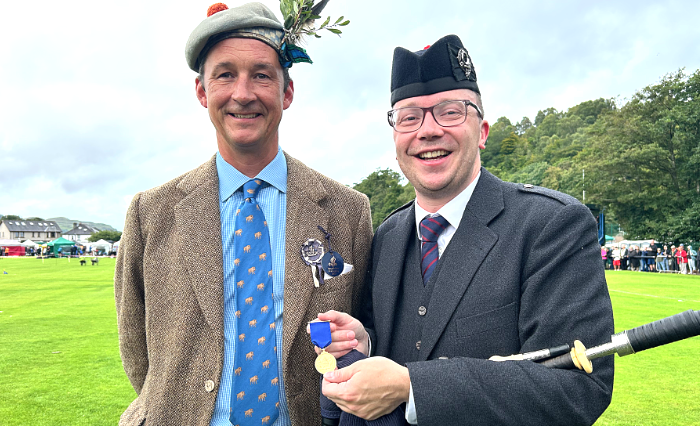
I think it would be fair to say that everything went off very smoothly over the two days of the Gathering held in Oban last week. It is no easy task to organise more than 100 highly motivated pipers and more than 30 judges and stewards, so all credit to John Campbell, Kilberry, Piping Steward, and Assistant Steward Torquil Telfer and their team.
Conditions could have been kinder on Games Day but the Noah’s flood predicted by the weather people failed to materialise and the day remained warm and damp and rather quiescent.
By Robert Wallace
The coveted Gold Medal was won by Steven Leask playing the MacLeans’ March and the judges reported a very fine performance of maturity and control on a beautiful instrument. I was told that Brendan Eade from New Zealand and Sean McKeown from Canada, second and third respectively, were not far behind. Their day will come no question.
In addition to the medal, Steven received a small silver ‘tumble cup’ presented by the Highland Society of London. This marked the 150th anniversary of the presentation of the Gold Medal by the Society for competition at Oban in 1875.
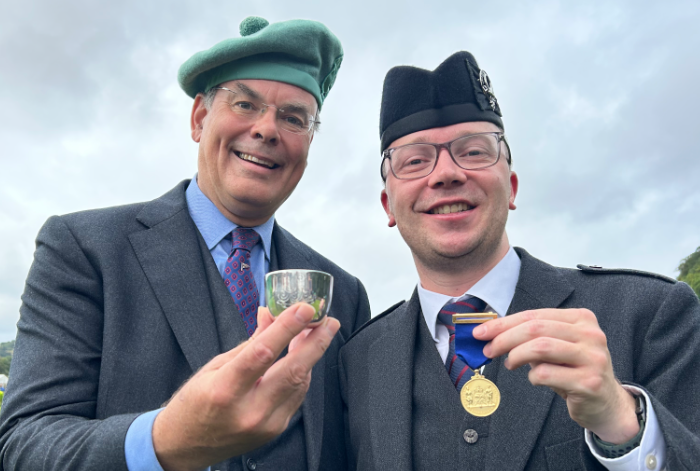
And here is a short video of Steven leading the march to the games…
Before we get to more detailed comments on the Senior Piobaireachd, I would like to pass on the general buzz there was around the performance of Finlay Johnston in the Former Winners’ March, Strathspey and Reel last Wednesday night.
This has to be the toughest ceòl beag test there is. Six tunes of each required and the piper can be asked to play them in any order at all. And then, when he has his head round that, he has to play them twice through, one run exactly mirroring the next.
I was unable to attend the contest but have it on good authority that Finlay’s instrument was outstanding, with a warmth and richness in the drone that you don’t always hear these days. All modern pipes are in tune of course, but sometimes they lack the required harmonic depth, drones neutered by stock blocking water systems and over-tight bridles. Finlay’s pipe, his accurate, musical playing, his immaculate technique – an unbeatable combination – took him to first place.
Now to the Senior Piobaireachd. Adjudicator Jack Taylor has kindly forwarded these comments………
The Oban Senior Piobaireachd this year was notable for the wide range of repertoire. This was appreciated by judges and audience, and indicates that the ‘long list’ approach for these competitions is working well.
Old favourites Scarce of Fishing, In Praise of Morag, Colbeck and Unjust Incarceration sat with 20th Century compositions Farewell to the Queen’s Ferry, the Edinburgh Piobaireachd and A Son’s Salute to his Parents. Then there was the seldom heard End of the Little Bridge, Lament for Hugh and Port Urlar.
Port Urlar is a complex piece and was chosen for Stuart Liddell. It was mid afternoon when he struck up his rich, mellow pipe, tuned it to the last harmonic, and set off. From first to last he drew out every drop of music, and some more, not afraid to add his own touches and timing. A master class. First prize.
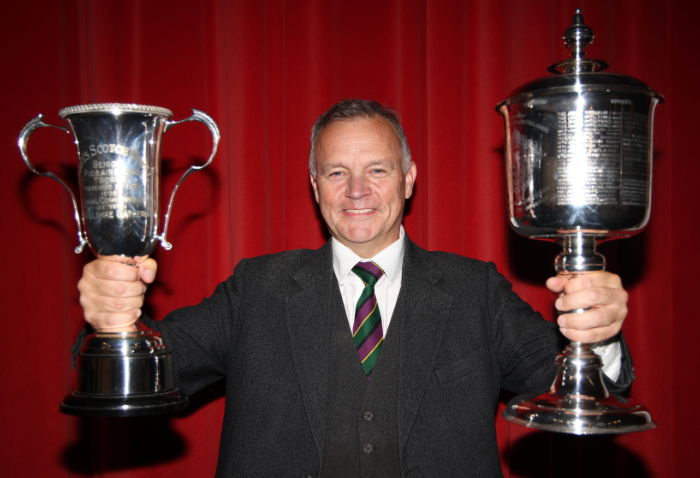
Talking of rare tunes Finlay Johnston’s Lament for Hugh was going so well when it seemed that momentary doubt about crunluaths to low G, or was it A, led to a tiny low A melody note appearing, enough to make him halt there and then. Many might have kept going, and been rewarded, slip notwithstanding.
Colin MacLellan, bravely returning to competition, caught the full drama of End of the Little Bridge. The Urlar called us to gather with long Bs and Ds following brisk GDEs on G and A. The five tripling and Crunluath variations rippled out, each building from the last with a B becoming a C then a D, forcing an increasing pace and musical tension. A missed line and note errors hardly mattered.
Nick Hudson played an almost flawless (one B gracenote missed in a D crunluath) Farewell to the Queen’s Ferry for second place. The pipe was sweet and true, with a vibrant bass. Nick’s interpretation was studied, subtle and expressive. Marked tempo contrast between singlings and doublings kept it musically alive. Could he have done more with phrase endings?
On Nick’s tail was ‘The Bull’. Under Angus MacColl’s sure control he was docile enough, but always menacing. The interpretation was smooth, up tempo but never rushed, and Angus’s clear technique and those instinctive nuances that make such a difference gave him third place.
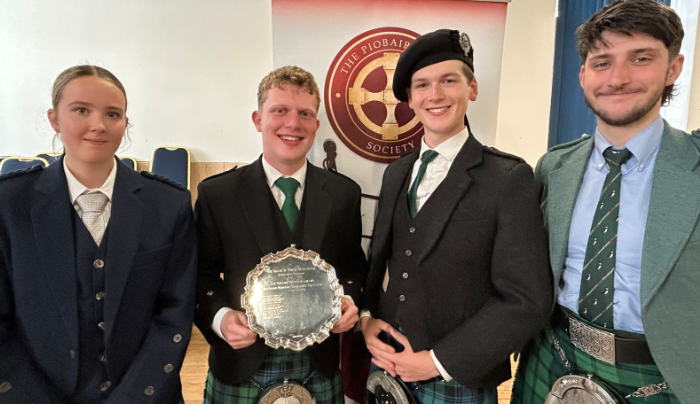
The Daughter’s Lament is a lyrical beauty. Jamie Forrester drew out its musical potential, especially in the ground doubling. Some loose embaris and crunluaths counted against him as much as his ringing deep pipe was to his advantage. Fourth prize.
Fifth was Cameron Drummond with The Edinburgh Piobaireachd. He gave a poised performance. There was debate on the bench about whether he overdid the expression in places, particularly line ends in the groundwork. The overall tempo might have been lifted a just a shade.
Ian K MacDonald took the round approach in the ground of Scarce of Fishing, maybe too much so. This and small technical blemishes kept him out of the list. The thump of brogue on wood was a distraction in the a mach.
Alasdair Henderson had a strong Mary’s Praise. Arguably he could have extended the mid-phrase in places, and smoothed out the variation following the groundwork. Glenn Brown was on the fast side in A Son’s Salute to his Parents.
Jack Lee caught the mood of ‘Morag’ well with due weighting of the three note groups in the ground, his round variation flowed well, but a hint of over phrasing in Taorluath and Crunluath dampened the flow.
Iain Speirs had the hairs on the neck at attention with the ground of the Unjust Incarceration. The dithis was perhaps just too doleful. Greg Wilson was strong in the first half of Colbeck, but lost some shape later. Likewise William McCallum’s Antrim.
Technical mishaps, note errors or wandering drones meant it wasn’t to be for others, but Oban’s Senior Piobaireachd players did not disappoint. Judges Ian Duncan, Patricia Henderson, Jack Taylor.
- More to follow from the Argyllshire Gathering soon. Check out the first day’s results here.
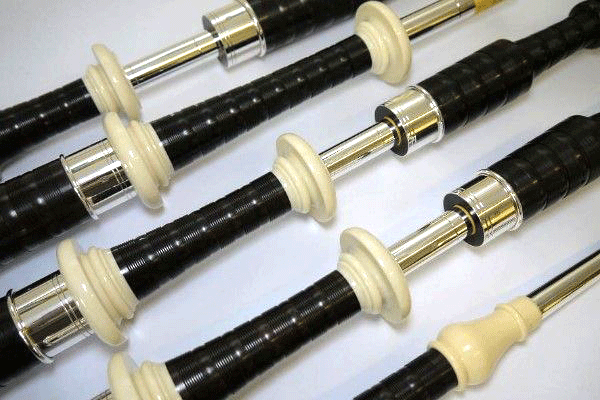
Bagpipes – DN4A – High Quality Set in Plain Silver
The DN4A bagpipe by David Naill is a high quality, mid-level bagpipe in African blackwood, fully beaded and combed. The DN4A model features plain, hallmarked sterling silver and comes standard with a backwood pipe chanter, beaded silver ring caps and silver mouthpiece tube, Canmore synthetic bag (hide bags on request), with velvet cover and silk cords (zipper bag extra). There’s a choice of gre…















